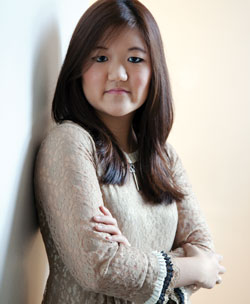Journalism & Justice: Did Innocence Project Student Reporters Get Too Close to Lawyers?

Monica Kim was thrilled to gain a spot in Protess’
class and taken aback to learn he would not be
leading it. “I was under the impression that I
would be working with Professor Protess. It was
kind of a surprise for everyone in the class.”
Photo by Len Irish.
Last spring Monica Kim, a Northwestern University journalism student, ventured into some of Chicago’s roughest and most impoverished neighborhoods as part of a class project to investigate whether a man was wrongfully convicted of murder.
Kim was a little nervous at first as she knocked on doors to locate witnesses on the city’s West Side, but she pressed on because she believed she was doing important work. That work began to pay off when, one morning two blocks from where the murder took place, Kim and classmate Taylor Soppe found a woman who witnessed the crime.
“We just told her that we were students and that we were investigating this case and she said, ‘I’ll tell you all about it,’ ” Kim recalls.
In the span of 10 weeks, Kim and her classmates, along with the help of a private investigator, compiled dozens of interviews and thousands of documents that suggested Donald Watkins could not have committed the 2007 shotgun murder of Alfred Curry. Their findings were posted on a university website in June along with the documents and transcripts they acquired, much of them through Freedom of Information Act requests.
It was another shining moment for the Medill Innocence Project, the famed Northwestern program that has helped exonerate 11 wrongfully convicted people and was, by many accounts, instrumental in prompting Illinois’ then-Gov. George Ryan to suspend executions and clear the state’s death row.
The difference for Kim and her classmates was that the class was not led by its highly regarded founder, David Protess. Protess was forced into a leave of absence—and has since retired from the university—after university officials and prosecutors questioned his integrity and investigative techniques. Another professor took over the course, while Protess continues teaching at an off-campus location.
The case has exposed the potential dangers of mixing student journalism and legal advocacy, and raised questions about what role, if any, investigative journalists should have in assisting lawyers seeking to correct alleged injustices.
Click here to read the rest of “Journalism & Justice” from the January issue of the ABA Journal.



